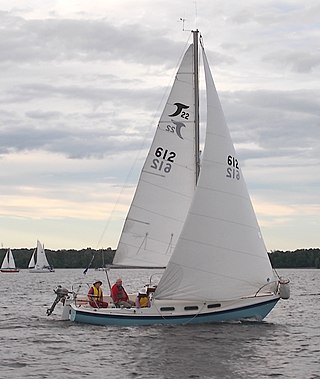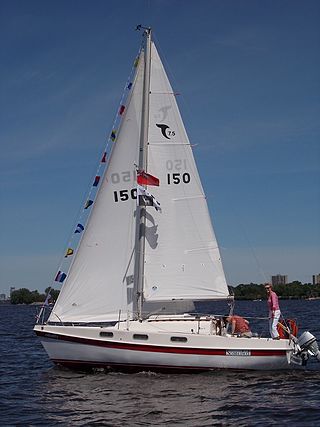
The San Juan 21 is an American trailerable sailboat, that was designed by Don Clark as a cruiser-racer and first built in 1970.
The Santana 22 is an American trailerable sailboat, that was designed by Gary Mull and first built in 1966.

The Santana 20 is an American trailerable sailboat that was designed by W. Shad Turner as a day sailer, one design racer and pocket cruiser. It was first built in 1976.
The Triton 22 is an American trailerable sailboat, that was designed by Gary Mull and first built in 1985. The design is out of production.

The Tanzer 22 is a Canadian trailerable sailboat, that was designed by Johann Tanzer and first built in 1970. The design went out of production in 1986.

The Tanzer 7.5 is a Canadian trailerable sailboat, that was designed by Johann Tanzer and first built in 1977. The design went out of production in 1985.

The Mirage 24 is a Canadian trailerable sailboat designed by Cuthbertson & Cassian, the naval architecture design division at C&C Yachts, as a Midget Ocean Racing Club (MORC) racer and first built in 1972.

The Kelt 7.6 is a French trailerable sailboat, that was designed by Jean Berret and first built in 1980.

The Paceship PY 23 is a Canadian trailerable sailboat, that was designed by John Deknatel of C. Raymond Hunt Associates and first built in 1973.

The Buccaneer 200 is an American trailerable sailboat, that was designed by Alan Payne and first built in 1974.
The Hunter 20 is an American trailerable sailboat that was designed by Cortland Steck as daysailer and small cruiser and first built in 1983.
The Pearson Electra is an American trailerable sailboat that was designed by Carl Alberg as a Midget Ocean Racing Club (MORC) racer and first built in 1960.
The Cal 22 is an American trailerable sailboat that was designed by C. R. Hunt Associates as a cruiser and first built in 1984.

The Cal 24 is an American trailerable sailboat that was designed by C. William Lapworth as a Midget Ocean Racing Club (MORC) racer and first built in 1958.
The Cal 2-24, also called the Cal 24-2 and the Cal 24 Mark II is an American trailerable sailboat that was designed by C. William Lapworth as a racer and first built in 1967.
The Grampian 23 is a Canadian trailerable sailboat that was designed by Alex McGruer as a cruiser and first built in 1971.

The Matilda 20 is a trailerable sailboat that was designed by Robert Tucker as a daysailer and a cruiser and first built in 1971.
The Montego 19 is an American trailerable sailboat that was designed by Johannes "Jopie" Helsen as a pocket cruiser and first built in 1976.
The Nordica 20 is a Canadian trailerable sailboat that was designed by B. Malta-Muller as a cruiser and first built in 1975.
The Spirit 21, also called the Spirit 6.5 for its length overall in meters, is an American trailerable sailboat that was designed by Hank Hinckley as a cruiser and first built in 1977.











